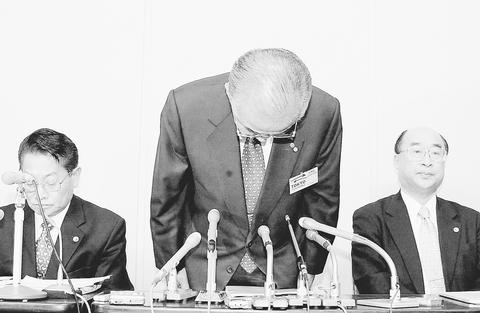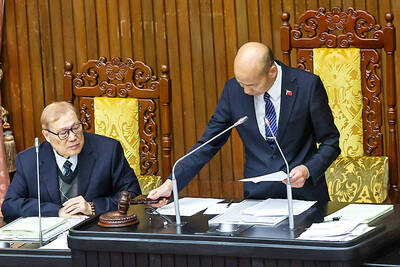Japanese constructors are struggling to survive as banks tighten loan conditions to step up bad-loan disposals and the government cuts spending on public works under an austere budget, analysts said yesterday.
"There are winners and losers in the construction sector and the division separating the two groups is becoming clearer," said Daisuke Fukushima, construction analyst at Nomura Research Institute.

PHOTO: AFP
"What we are seeing here is companies in the losing camp are making their exits from competition," Fukushima said.
On Sunday, construction firm Sato Kogyo Co Ltd filed for bankruptcy with group liabilities totalling Japanese yen 567.54 billion (US$4.3 billion) as of last September.
The builder was seen as yet another victim of the tighter loan conditions of Japanese banks, which are trying to overcome massive bad loans through write-offs. Last December, middle-sized builder Aoki Corp collapsed after abandoning restructuring efforts as banks grew worried about its financial performance.
"Many contractors cannot survive without bank loans. The loans are the lifeline for them," said Kazuhiro Hirano, construction analyst at Tokai Tokyo Research Center.
"Now is a very difficult time for companies to obtain bank loans because banks are under pressure from the government to stop extending loans in order to speed up bad loan write-offs," Hirano said.
The analyst added there were too many contractors in Japan, saying a shake-up in the sector was inevitable.
Construction firms kept rising in volume in the 1990s and peaked at 601,000 in 2000, according to Japan Federation of Construction Contractors.
In 2001, the number fell to 586,000, marking the first decline in 11 years.
Aside from tightening bank loans, a cut in government spending on public works as part of an economy-boosting reform drive advocated by Prime Minister Junichiro Koizumi dealt a major blow to contractors.
"Many contractors used to earn lots of money from public works, but the government is sharply cutting the number of public works under an austere budget," Nomura's Fukushima said.
For the next fiscal budget starting April 2002, Tokyo earmarked Japanese yen 6.5 trillion for public works, down sharply from Japanese yen 7.2 trillionn this year.
Analysts said contractors with a high dependency on public projects face particularly tough times.
Public works accounted for 50 percent of Sato Kogyo's total projects, while struggling general contractors Tobishima Corp and Hazama Corp rely on publicly funded jobs for 50 percent and 40 percent of their total jobs respectively.
For Japan's largest contractor Shimizu Corp, public works projects account for less than 20 percent and for Haseko Corp, the nation's top condominium contractor, the ratio stands at 4 percent.
But Mark Brown, construction analyst at ING Barings, warned a slump in the private sector was threatening the overall construction business.
"As we have seen a decline in the government spending, likewise there is a slump in the private sector," he said.
"Up until last year, private sector demand was not so bad but now we are seeing a big correction on the downside," Brown said.
Shares in Tobishima plunged nine yen or 20.5 percent to close at 35 Japanese yen and Hazama lost Japanese yen 3 or 7.3 percent to Japanese yen 38 .
But Shimizu rose Japanese yen 26 or 5.7 percent to Japanese yen 479 . Haseko rose Japanese yen 1 or 3.4 percent to Japanese yen 30 .

DEFENDING DEMOCRACY: Taiwan shares the same values as those that fought in WWII, and nations must unite to halt the expansion of a new authoritarian bloc, Lai said The government yesterday held a commemoration ceremony for Victory in Europe (V-E) Day, joining the rest of the world for the first time to mark the anniversary of the end of World War II in Europe. Taiwan honoring V-E Day signifies “our growing connections with the international community,” President William Lai (賴清德) said at a reception in Taipei on the 80th anniversary of V-E Day. One of the major lessons of World War II is that “authoritarianism and aggression lead only to slaughter, tragedy and greater inequality,” Lai said. Even more importantly, the war also taught people that “those who cherish peace cannot

STEADFAST FRIEND: The bills encourage increased Taiwan-US engagement and address China’s distortion of UN Resolution 2758 to isolate Taiwan internationally The Presidential Office yesterday thanked the US House of Representatives for unanimously passing two Taiwan-related bills highlighting its solid support for Taiwan’s democracy and global participation, and for deepening bilateral relations. One of the bills, the Taiwan Assurance Implementation Act, requires the US Department of State to periodically review its guidelines for engagement with Taiwan, and report to the US Congress on the guidelines and plans to lift self-imposed limitations on US-Taiwan engagement. The other bill is the Taiwan International Solidarity Act, which clarifies that UN Resolution 2758 does not address the issue of the representation of Taiwan or its people in

The Philippines yesterday criticized a “high-risk” maneuver by a Chinese vessel near the disputed Scarborough Shoal (Huangyan Island, 黃岩島) in a rare incident involving warships from the two navies. The Scarborough Shoal — a triangular chain of reefs and rocks in the contested South China Sea — has been a flash point between the countries since China seized it from the Philippines in 2012. Taiwan also claims the shoal. Monday’s encounter took place approximately 11.8 nautical miles (22km) southeast” of the Scarborough Shoal, the Philippine military said, during ongoing US-Philippine military exercises that Beijing has criticized as destabilizing. “The Chinese frigate BN 554 was

LEISURE: The new law adds Confucius’ birthday, the anniversary of the Battle of Guningtou, Constitution Day and Little New Year as national holidays The Legislative Yuan yesterday passed new legislation adding four national holidays and making Workers’ Day a national holiday for all sectors. The Chinese Nationalist Party (KMT) and the Taiwan People’s Party used their combined majority in the legislature to push the jointly proposed draft through its third and final reading. This new law supersedes the existing regulations for the implementation of memorial days and state holidays, which are administered by the Ministry of the Interior. The new law recognizes Confucius’ birthday on Sept. 28, the anniversary of the Battle of Guningtou on Oct. 25, Constitution Day on Dec. 25 and “Little New Year,”